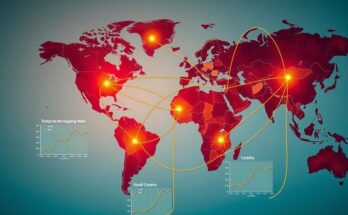The American economy has been challenged recently by the pandemic and rising inflation, leading to voter concerns ahead of the 2024 election. Candidates Kamala Harris and Donald Trump propose distinct economic plans, with Harris focusing on tax relief for families and housing, while Trump emphasizes tariffs and tax cuts. Economists weigh these proposals, with mixed assessments of their potential impacts on future growth and federal deficits.
In recent times, the American economy has faced turbulent waters, initially brought on by the COVID-19 pandemic, which inflicted severe damage on growth and employment. As restrictions eased and businesses reopened, inflation surged, intensifying financial pressures on families. Not surprisingly, ahead of the 2024 election, polls from Gallup and Pew showed the economy is a priority for voters. Political candidates have proposed contrasting economic strategies: Vice President Kamala Harris aims to cut taxes for middle-class families and increase housing availability, while Donald Trump focuses on eliminating inflation and boosting manufacturing through tariffs and tax reforms. Currently, economic indicators show modest stability; the economy grew by 2.8% in the third quarter, and inflation stabilized at 2.4% in September, though unemployment crept up to 4.1%. Economists are weighing in on whose plan might be more favorable for the economy. Mark Zandi from Moody’s Analytics argues that a Harris presidency would preserve the existing economic framework while maintaining tax cuts and aid for vulnerable families. In contrast, Trump may move aggressively with tariffs and deportations, potentially leading to higher inflation and slower growth. Deutsche Bank’s Brett Ryan notes that neither candidate’s proposals sufficiently address the long-term stability of federal deficits and debt nor the looming social security cuts that need urgent attention. Their plans may yield limited growth, with Trump’s additional tax cuts providing marginal boosts while tariffs could hinder overall economic performance. Claudia Sahm from New Century Advisors highlights the significance of affordable housing and productivity growth; Harris’s plans might address critical housing shortages. Each candidate brings forth distinct economic policies, raising questions about their potential impacts on growth, inflation, and the workforce. Although the U.S. economy stands strong at nearly $30 trillion, future success hinges on the implementation of effective and coherent policies. As the nation prepares to elect its leader, the choice will steer economic direction amid complex challenges.
The backdrop of this analysis lies in the aftermath of the COVID-19 pandemic, which significantly disrupted the American economy, leading to substantial reductions in growth and employment. As constraints have lifted, inflation has emerged as a pressing issue, affecting everyday purchases and financial stability of families. Amidst this context, concerns about the economy’s health are paramount in the upcoming election, prompting candidates to outline differing strategies aimed at addressing these economic dilemmas.
In conclusion, the economic debate between Trump and Harris paints a picture of two contrasting visions. Harris aims for continuity and support of working families, while Trump seeks to reshape economic policies through protectionism and tax incentives. Both candidates recognize the importance of stabilizing the economy and address immediate concerns, but economists indicate that neither has provided a comprehensive solution to the looming fiscal challenges facing the nation. As the election approaches, voters will weigh these differing visions for the country’s economic future.
Original Source: www.newsweek.com



